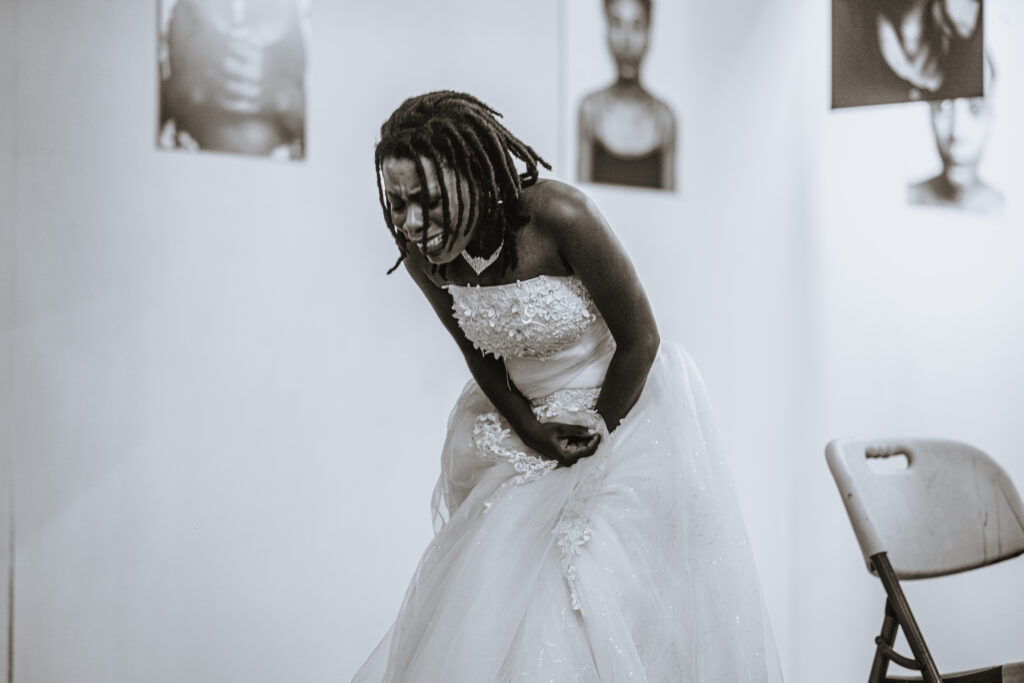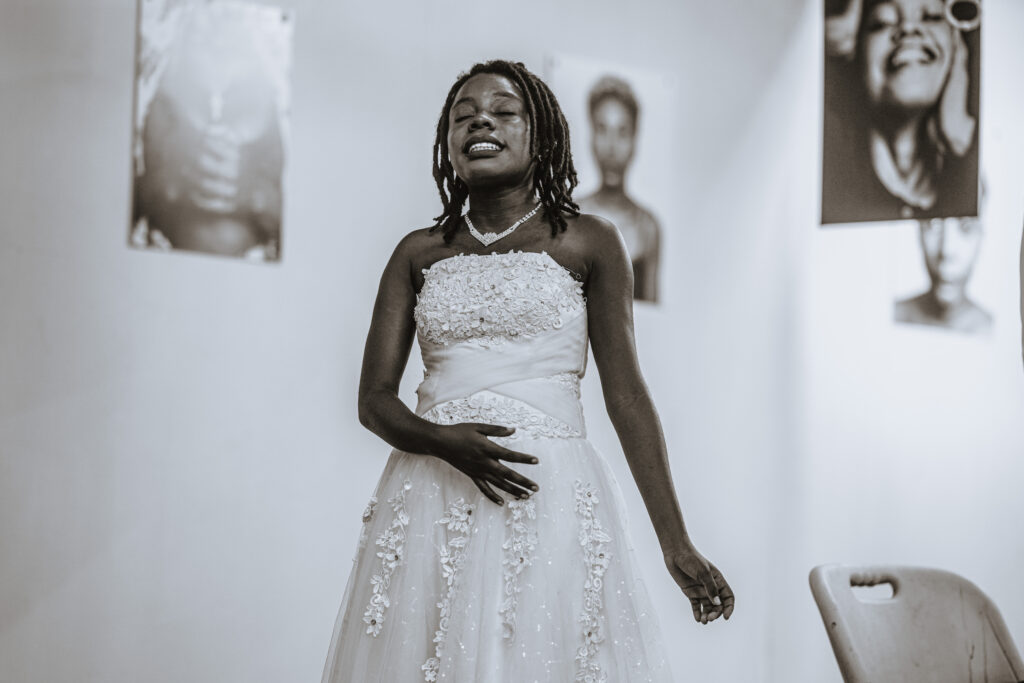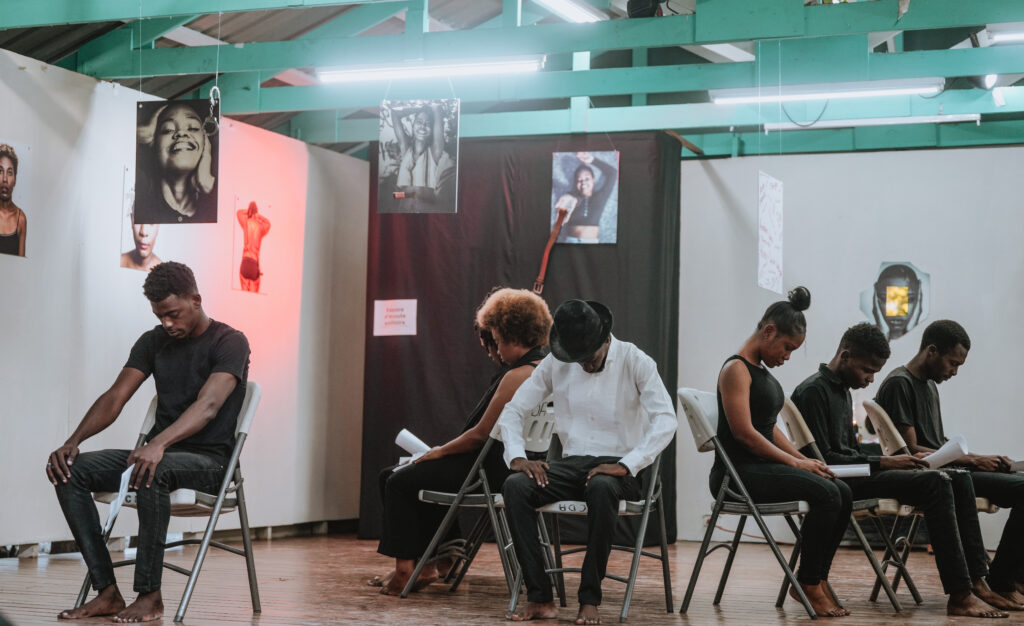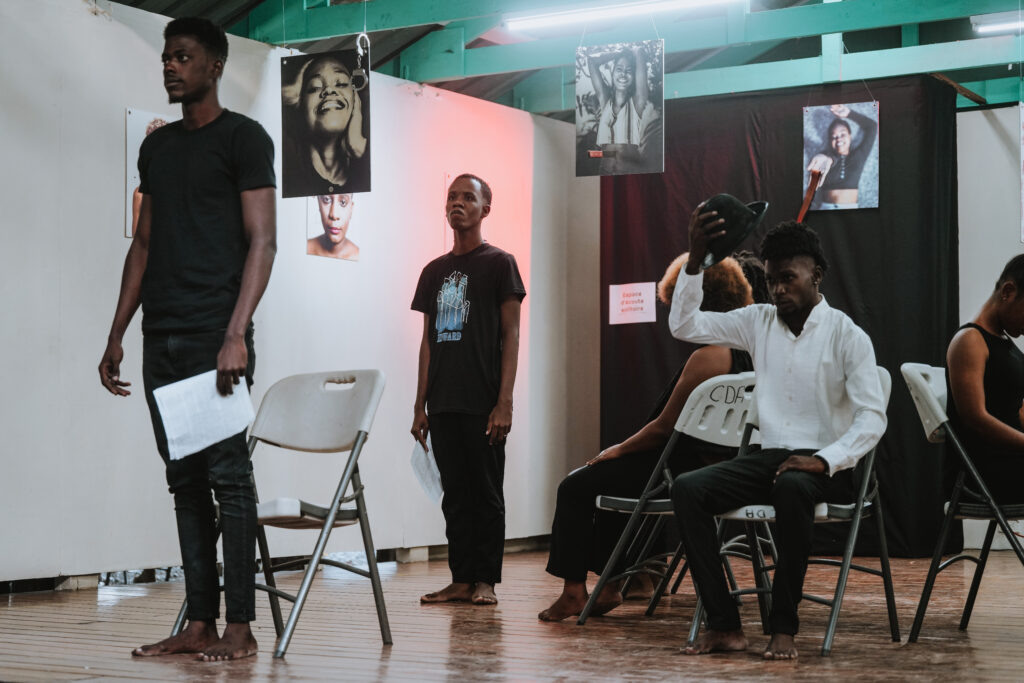This post is also available in: Kreyol
I’m a young author born in a country where you can count on your fingers how many theatres there are
ANDRISE PIERRE
December 2022, En Lisant Festival play entitled Elle voulait ou croyait vouloir et tout à coup elle ne veut plusThe 7th edition of the En Lisant Theatre Festival took place in December of 2022 in Port-au-Prince. Held from December 12th-18th, the theatre festival founded and led by Eliezer Guerismé focused on the theme of Violence and Contestation. To explore this theme through plays and reading, a series of talks, a web series, and a closing concert, the work of the writer, Andrise Pierre, was highlighted.
Andrise Pierre is a Haitian playwright and literature teacher whose plays have started to receive international acclaim. Her plays tackle social issues of violence within the family and within society.
As the guest of honor of this year’s festival, two of Andrise’s three plays Le Chêne Endormi and Vidé mon ventre du sang de mon fils were performed. She also led a playwriting workshop for aspiring female playwrights and wrote a web series that was produced by the students of the ACTE theatre school. We sat with Andrise Pierre to discuss her experience as En Lisant’s 2022 guest of honor.
How did you get into writing and how did you hone your craft over the years?
I have always been interested in theatre. Not as a writer but rather as a reader. When I was in high school, classical theatre class was one of my favorite classes. I was fascinated by how the characters are torn by the choices they have to make, how they don’t control themselves, how their feelings overwhelm them. Little by little, my love for literature led me to writing. And the choice to pursue theatre came by itself.
Writing came to my life at a time when I needed to purge, I needed to try putting the words and names to a loss, my brother’s assassination was gnawing at me. A mixture between rage, anger and a nameless sadness. If I didn’t speak, I could have suffocated. And I continue to write because the more I speak to the void, the more others that were hiding away awaken and show themselves.
I don’t know if one day I said theatre was what I wanted to do, but the form imposed itself on me, because one of the greatest abilities of theatre is to bring people together, many people, all people, in the same place. Maybe that’s why I write plays — because I need to share my voids, for them to resonate from the person reading it who decides to bring it to two actors who will share it with an audience. The voids are no longer mine, I am not alone, they ring in the emptiness of each and everyone else.
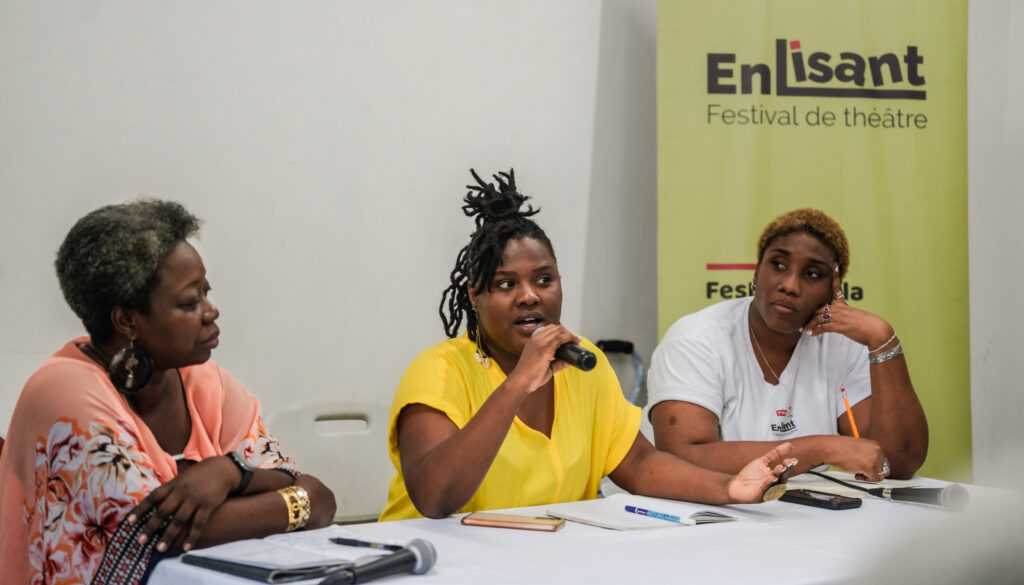
Q&A featuring Andrise Pierre alongside playwright, Gaelle Bien-Aimé and literature professor, Darline AlexisYou live abroad, and you returned to Haiti to participate in the En Lisant Theatre Festival despite the insecurity. How was your experience as the Guest of Honor as part of the En Lisant Theatre Festival this year? What does it bring to you as a playwright?
Since September 2022, I have been living in France where I am studying project management and cultural institutions. The invitation to the festival is one of the best reasons I had to come to my country, see family, and live the wonderful experience that the En Lisant Theatre Festival offers every year.
If I had listened to the advice of many friends, I would not have come: “Everyone wants to leave and you want to go back.” Many share the same sentiment, despite everything you hear, I don’t see my life anywhere else but in my country.
This invitation was an honor and a joy without a name. I’m a young author born in a country where you can count on your fingers how many theatres there are; where the conditions of people’s lives, the lives of people practicing artistic professions such as actors, sculptors, dancers, painters are so poor. I think to choose me, produce my plays, read my work, give my work space to touch others, is to give many other young artists and authors like myself a push. We need more initiatives and more events like this.
I don’t know what my pieces do to the public, but I hope they are tormented
As part of the En Lisant Theatre Festival, I attended the performance of 2 plays you wrote, Le Chêne Endormi and Vidé mon ventre du sang de mon fils, which explore how people live and discuss violence. For these pieces you draw from your personal experience. Where did you get the courage to write about these difficult topics and what process do you use to do it? Did you research from your family like the protagonist did with her mother in Le Chêne Endormi?
Yes. Both of these plays deal with violence. Vidé mon ventre du sang de mon fils speaks of violence and impunity, but also of the mourning and suffering of those who lost their loved ones. This piece is a critique of our society and its faults. The mother’s rape is the backdrop that explains the chaotic relationship she has with her deceased child: impossible to love, impossible to hate.
I wrote this piece based on my brother’s murder, but we cannot count the number of brothers and children who have been murdered, nor how many crimes are classified without any prosecution.
Both stories are inspired by my life and the lives of my family. I say inspired because most of the work remains a work of fiction. A fiction I adapt to the testimonies and research I do.
Le Chêne Endormi is the last project I have at the moment, which I continue to work on. It takes up the theme of the family but more expansively. The father is a man who used to beat and humiliate the mother. In the play, he is dead, but his presence looms in all of the conversations people have. He is the pillar that, in a sense, connects and marks each character in a different way.
I also wanted to question the creative process, that’s why the main character is written as an artist setting out to write about her family’s story. In the process of creation, she questions her surroundings but also herself about who her father was.
It is a difficult story shared in a family whose members do not all have the same recollection of what happened. My character’s dilemma is figuring out how she can tell this story and which part of it is hers.
The audience at the two performances followed closely and had a visceral reaction. What do you hope your pieces do for the public?
Aristotle says that tragedy awakens in us pity and fear. Pity for others, fear for ourselves. And the result of these two feelings leads to pleasure.
I do not write a play to defend moral values, nor to give lessons, even if in my plays I take a stand, especially as a feminist. But I still hope that what I want to show does not pass for a story I invented for people to come and watch, spend some time and forget.
I don’t know what my pieces do to the public, but I hope they are tormented. I want them to ask questions about all that animates them that is good, very good, not so good, and no good at all.
Photos by: Victoria Onélien

